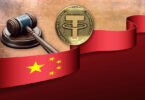To celebrate world environment day, WeBank and two other organizations unveiled plans for a new “Green Mobility Inclusive Platform” that leverages blockchain, according to a Sina report. WeBank was founded by Tencent, the Chinese giant that owns WeChat and WeChat Pay. The online bank boasts transaction levels of up to 600 million a day. The other two parties are the Beijing Environment Exchange and Beijing Green Inclusive Technology.
The project aims to encourage more environmentally friendly travel to reduce carbon emissions. China has 348 million motor vehicles and 66 cities have more than a million cars.
Project participants will earn points for traveling in a more green manner and in turn, they will receive prizes or services from sponsors based on their emission reductions. The initial focus is on reducing the number of cars on the road. But the plan is to expand the platform to green driving behavior, public transport, subway and other modes of transport.
The initiative will use the FISCO BCOS blockchain, an enterprise blockchain technology where WeBank and Tencent were some of the founding members.
At the unveiling event, WeBank released a whitepaper on a social governance framework to incentivize good deeds using blockchain technology. The concept is called MERITS (Measurable Ethics: Rating, Incentivization, Tracking & Supervision Framework).
Measuring goodness
Henry Ma, CIO and EVP of WeBank explained how the green project fits with WeBank’s ESG goals and how to measure “goodness”. He highlighted that the current social governance model is dominated by penalties and pondered a shift towards incentives, the carrot versus the stick.
He believes one of the reasons for a greater emphasis on the stick, is penalties are easier to implement. Promoting incentives requires technical tools, and far more coordination compared to punishment. And incentive protocols also need a governance mechanism for information flow and capital flow.
The first step towards a platform driven by incentives is the need for metrics. We’re used to metrics such as temperature, humidity, and altitude. Ma suggested there are similar ways of measuring goodness, such as emission reductions or blood donations.
Next up is the incentive mechanism or reward. Ma believes that while these will include material rewards, they shouldn’t be limited to that. There’s also a need for some exchange mechanism related to the specific good deed measurements to create a win-win for multiple parties.
In terms of governance, at an enterprise level, financial audits have now extended to ESG audits. So compliance is another element.
These three elements lead to the roles WeBank has identified: the issuer, distributor, sponsor, exchange platform, clearing service provider, regulator, and end user. It sees its role in the current project as clearing and settlement provider. The Beijing Environment Exchange will act as issuer and also a supervisor to ensure fairness and compliance.
Beijing Green Network Technology takes on the role of distributor and redemption platform and is responsible for measuring green travel behavior. Insurance companies, auto companies and others may act as sponsors.
As a parting note, Ma highlighted that China’s central bank digital currency (DC/EP) might be used for digital cash rewards in the future.
Two years ago, another blockchain green driving project was launched by China’s BYD the largest manufacturer of electric cars, in conjunction with VeChain.






